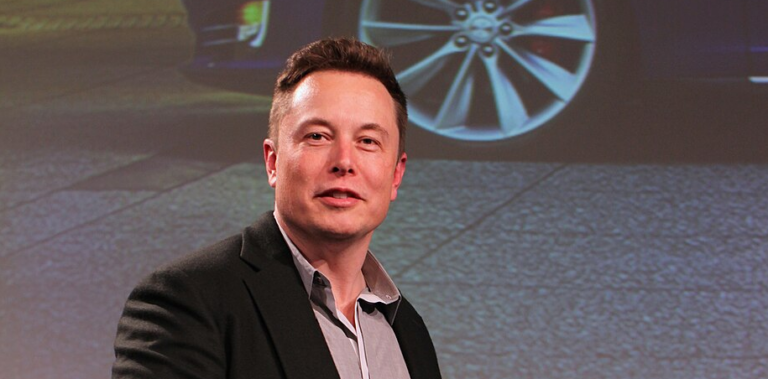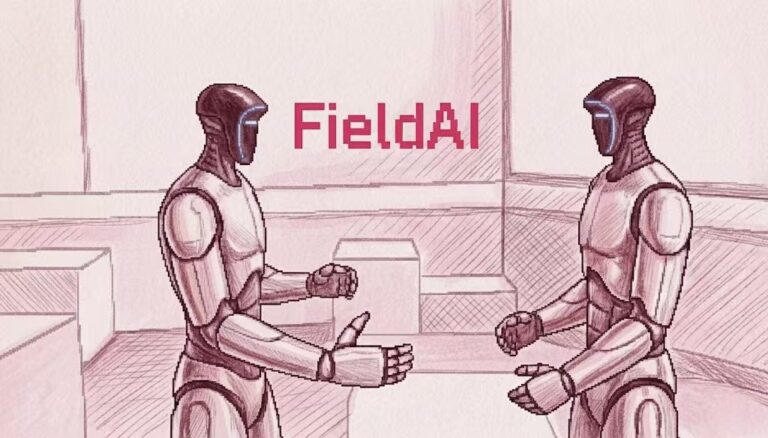Command Palette
Search for a command to run...
Serving OpenAI, Meta, Google, and Others, Three 22-year-old College Dropouts Have Revolutionized the AI Recruitment Landscape, and Mercor, Founded Just Two Years Ago, Is Valued at Tens of billions.
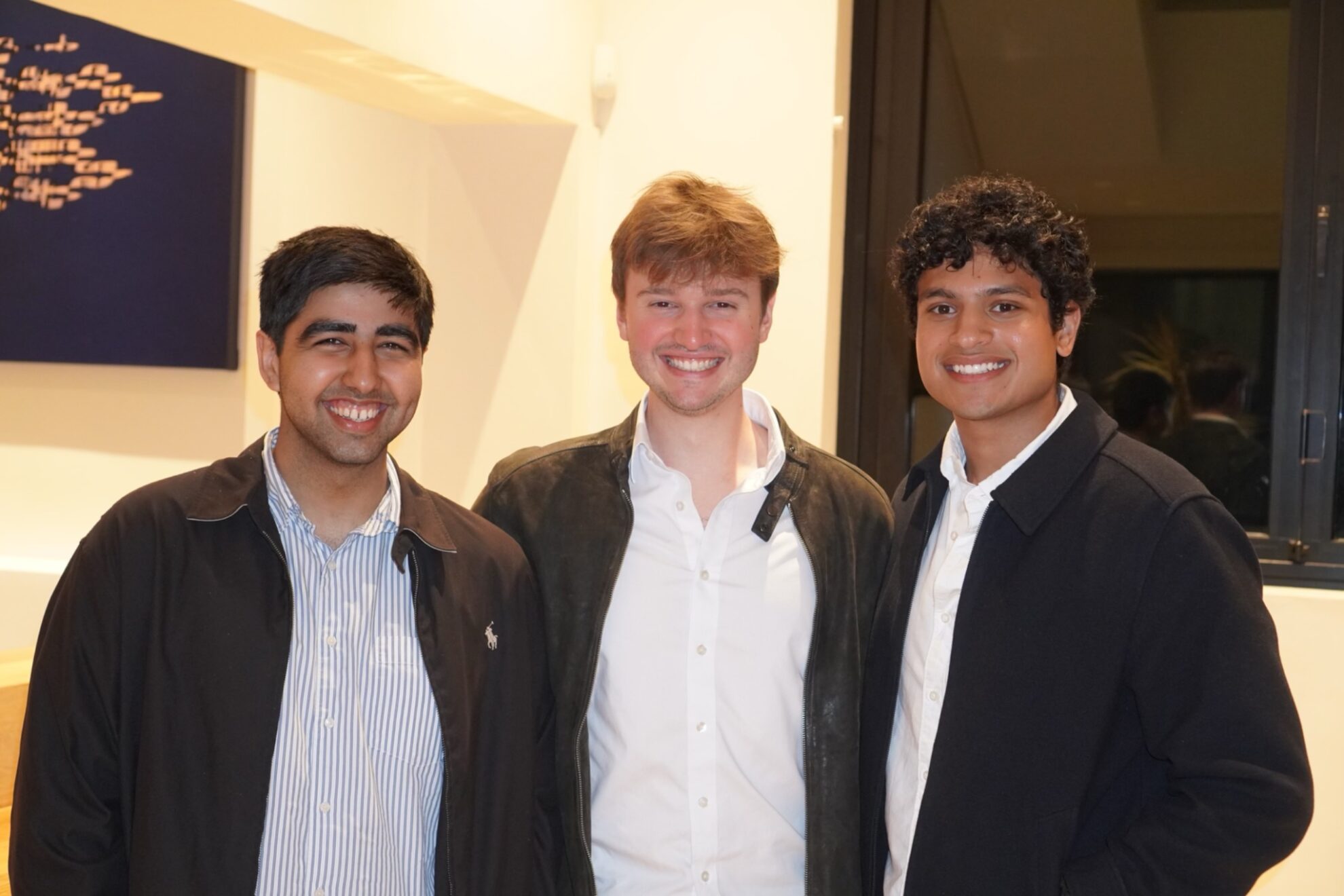
On October 27, 2025, Silicon Valley's venture capital community was ignited by a piece of news: Mercor, an AI startup founded just two and a half years ago, officially announced the completion of a $350 million Series C funding round.The post-investment valuation soared to $10 billion, a five-fold increase from the $2 billion valuation in February of this year.
This funding round, led by Felicis Ventures and with participation from top firms such as Benchmark and General Catalyst, not only propelled Mercor into the ranks of unicorns,What has drawn even more attention to the three founders, all born in the 2000s, whose average age is only 22. ——Brendan Foody, Adarsh Hiremath, Surya Midha.
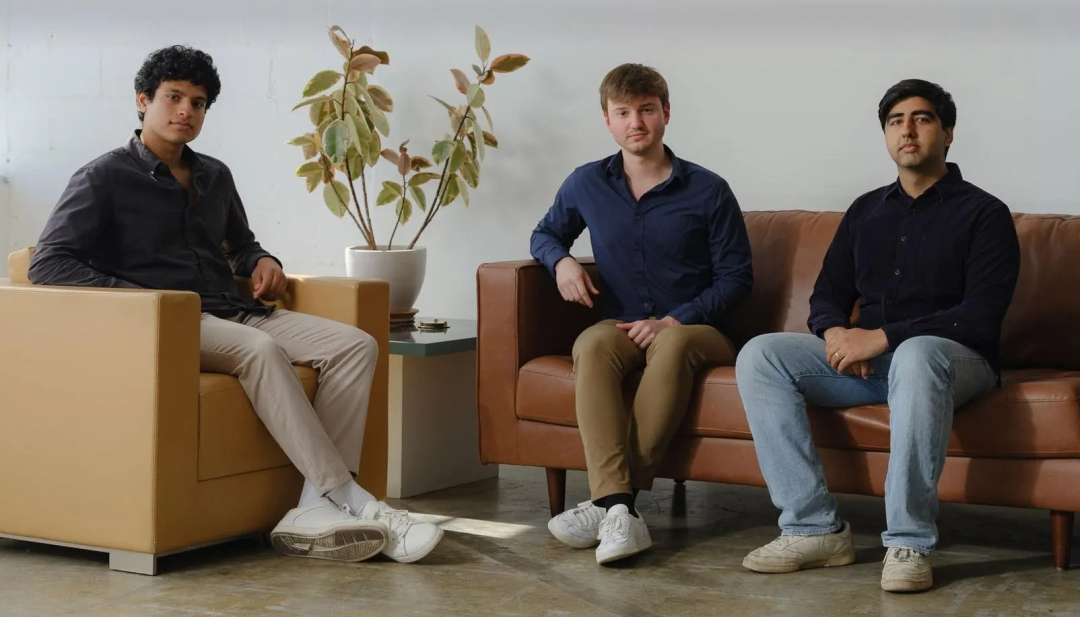
Their resumes are revolutionary: In 2023, the three dropped out of Harvard University and Georgetown University respectively, turned around and plunged into a small Silicon Valley office, using code to open up the blue ocean market of AI recruitment and large model evaluation.
In just 1,000 days, they transformed the company from zero revenue to an annualized revenue of approximately $500 million. Their client list includes the world's top five AI labs, such as OpenAI, Amazon, Google, Meta, and Microsoft, as well as chip giant NVIDIA. They even managed to acquire Scale AI's clients and employees when the latter was embroiled in controversy, staging a textbook example of a successful entrepreneurial comeback.
Company website:
https://www.mercor.com
The Beginning of "Rebellion": From Dropout to Youngest Billionaire
Every disruptive story often begins with a "beautiful accident." Mercor is no exception.
This AI recruitment and talent platform, valued at tens of billions of dollars, is backed by three college dropouts in their early twenties—Brendan Foody, Adarsh Hiremath, and Surya Midha.
The three were classmates at Bellarmine Preparatory School in the San Francisco Bay Area and had participated in the debate club together.
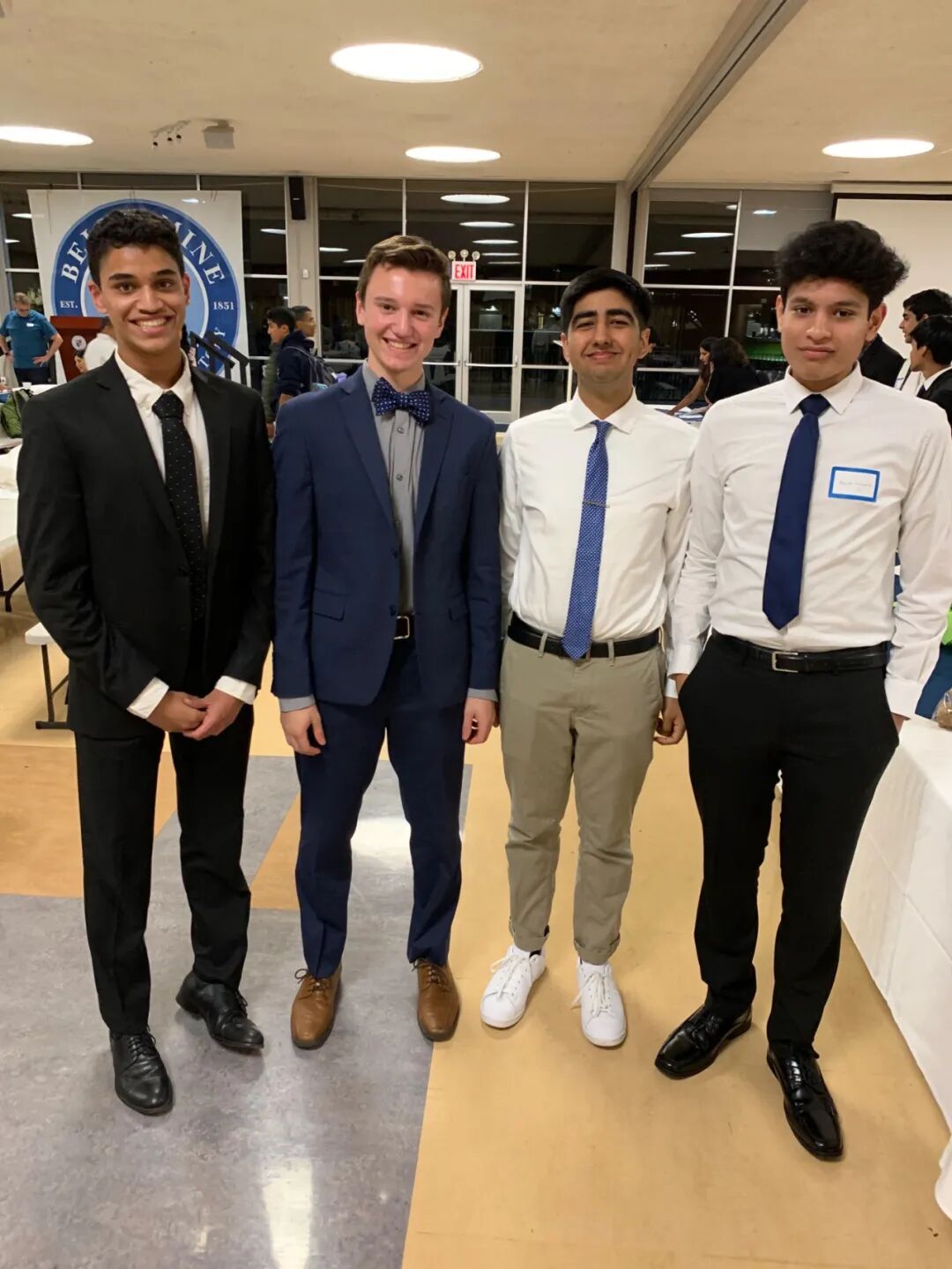
Subsequently, Brendan Foody and Surya Midha both attended Georgetown University. The former majored in economics and business administration, while the latter studied courses such as international relations, mathematics, and economics.Adarsh Hiremath, who is of Indian descent like Surya Midha, went on to study computer science at Harvard University.
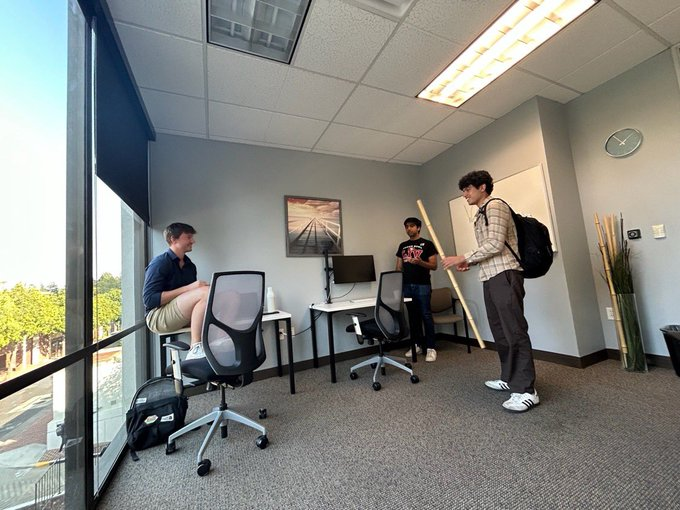
But after only a few months at Harvard, Foody decided to start his own business, and in 2023, during his sophomore year, he co-founded Mercor in his dorm room. Soon after, Hiremath and Midha made the same decision: to drop out of school and join Foody in starting their own business. "I firmly believe that workforce aggregation is the greatest opportunity of the 21st century, so I dropped out of Harvard and moved to San Francisco…", Hiremath wrote on LinkedIn.
Mercor was officially established in January 2023, with Brendan Foody as CEO, Adarsh Hiremath as CTO, and Surya Midha as COO.The platform, which originally focused on technology recruitment and talent matching, quickly shifted to providing "human-machine collaboration" data and talent services for artificial intelligence training.
With rapid expansion and increased funding, the company's Series C funding round in October 2025 valued it at approximately $10 billion. This propelled the three 22-year-old founders into the ranks of young tech entrepreneurs with billion-dollar fortunes, replacing Polymarket CEO Shane Copeland as the world's youngest self-made billionaires. Midha, the youngest of the three co-founders by birthday, is even younger than Mark Zuckerberg, who first appeared on the billionaire list in 2008 at the age of 23. "It's absolutely insane," Foody told Forbes. "It feels surreal. Clearly, this is far beyond what we imagined two years ago."
The three said they "did not regret" their "rebellious" decision to drop out of school. Hiremath said, "What I find most incredible is that if I hadn't been working at Mercor, I would have graduated from college just a few months ago."
For some, a four-year university education is not the most effective way to change the future landscape with innovative ideas. Foody believes that "school is just a place for people to practice skills, but these skills are often not very relevant to what they do in actual work."Faced with this reality, they realized that classroom learning alone could not truly solve the talent matching problem.
An Unexpected Turnaround from AI Recruiting to a Billion-Dollar Industry
In July 2023, Mercor was officially established in a small office of less than 50 square meters in Silicon Valley. Without luxurious decorations or a complete team, their entrepreneurial journey began with the most basic "manual matching"—screening massive amounts of resumes every day, contacting technical talents in India, and then recommending them to AI startups in Silicon Valley, earning a small intermediary fee in the process.
During that period, the three practically lived in the office, implementing an "overly demanding" model that even Silicon Valley entrepreneurs found astonishing: Foody was in charge of product direction, sleeping only 4 hours a day and repeatedly optimizing the questioning logic of AI interviews; Hiremath, as CTO, led the development of core algorithms, often sitting in front of the computer for more than ten hours at a time, solving the technical challenges of resume semantic search; Midha coordinated operations, dealing with clients and talents during the day and sorting out data feedback at night, using the logical thinking cultivated in the debate team to streamline business processes.
Their core product quickly took shape: enterprise clients simply needed to describe their job requirements in natural language, such as "full-time Python developer with computer vision experience," and Mercor's AI tools could perform deep semantic searches on hundreds of thousands of resumes, GitHub projects, and social media information within seconds to find the best-matching candidates. Clients could also directly watch the candidates' AI interview videos and complete the recruitment process with a single click. This model precisely addressed the recruitment pain points of AI companies—traditional recruitment processes are cumbersome and inefficient, while Mercor reduced resume browsing time to within seconds and the recruitment cycle from weeks to 24 hours, quickly attracting its first batch of clients.
In 2023, Mercor secured $3.6 million in seed funding led by General Catalyst.This allowed them to expand their technology team and optimize their AI models. By January 2024, the company's annual recurring revenue had exceeded one million US dollars, and it had built a talent pool of 100,000 people in 25 countries.
By this time, Mercor had grown from a small workshop-style team into a rising star in the field of AI recruitment.
The real turning point came in February 2024. While providing recruitment services to clients, the three unexpectedly discovered that the talent network they had built could not only be used for recruitment, but also held greater value. With the development of large model technology, AI labs such as OpenAI and Microsoft urgently needed a large number of professionals to evaluate models and label data, and Mercor's talent pool happened to cover experts in multiple fields such as software engineers and mathematicians.
Mercor subsequently adjusted its business direction, launching a large-scale model evaluation and data annotation service. It signed contracts with experts on its platform to provide professional feedback, image annotation, sentence writing, and other services for AI models. To support this new business,They recruited Sundeep Jain, Uber's former chief product officer with over ten years of experience, to serve as their first president.At the same time, the talent selection field was expanded to multiple industries such as lawyers, doctors, and journalists, and the talent network quickly expanded to 30,000 people.
This business transformation led to an explosive growth in Mercor's revenue:Annual revenue reached $70 million in 2024 and surged to nearly $500 million in 2025.
From "Recruitment Tool" to "Computational Workforce Network": Mercor's Underlying Technological Logic
Mercor's starting point was never "to create a smarter job search website," but rather to answer a deeper question: Can human abilities be quantified, predicted, and invoked in the form of APIs?
From day one, the founding team viewed candidates as "dynamic capability nodes," positions as "task allocation problems," and the recruitment process as a "pipeline for collecting human task performance data."
Mercor uses AI-powered talent prediction models to understand job seekers’ skills, experience, and strengths, and then matches them with companies that are looking for talent with the relevant background and abilities.
Mercor's slogan for job seekers is: "Join thousands of job seekers worldwide and find your ideal remote job with just one application through Mercor." Mercor's homepage currently lists positions including: Senior Software Engineer (hourly pay, remote work, $210 per hour); and Legal Intelligence Analyst (hourly pay, remote work, $90 per hour). Clearly, most of Mercor's current job postings are short-term, remote, hourly-paid positions.
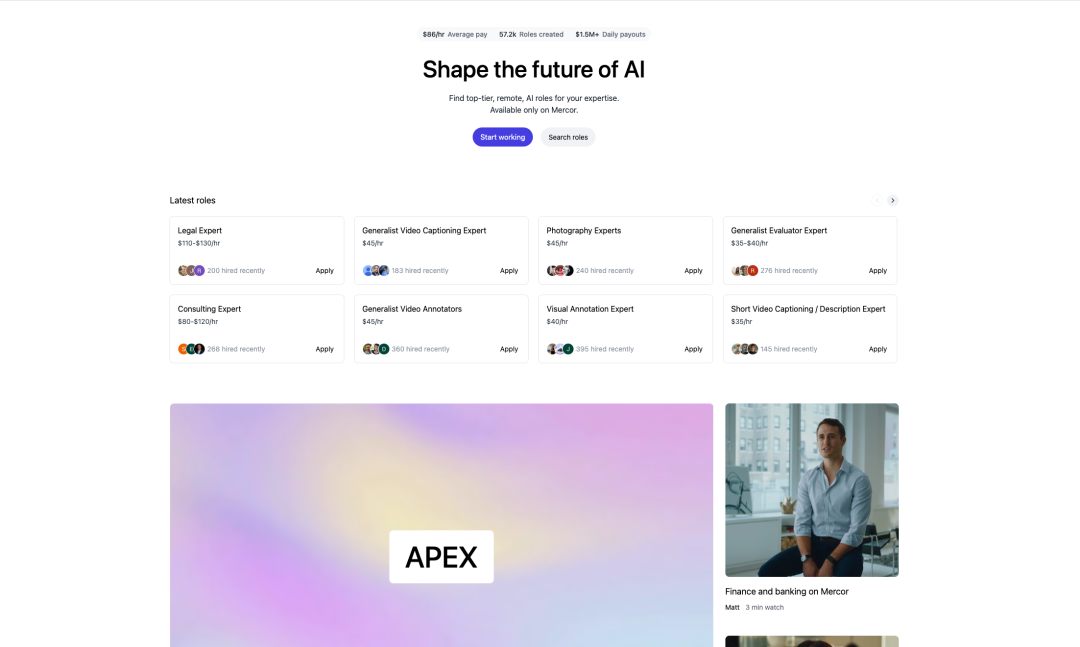
A Mercor blog post states, "Human interviews are easier when hiring five-year employees. But for five-cycle employees, an efficient matching automation system can provide a huge competitive advantage."Therefore, we will start with short-term contract work, and as the technology matures, we will gradually expand to long-term full-time jobs.
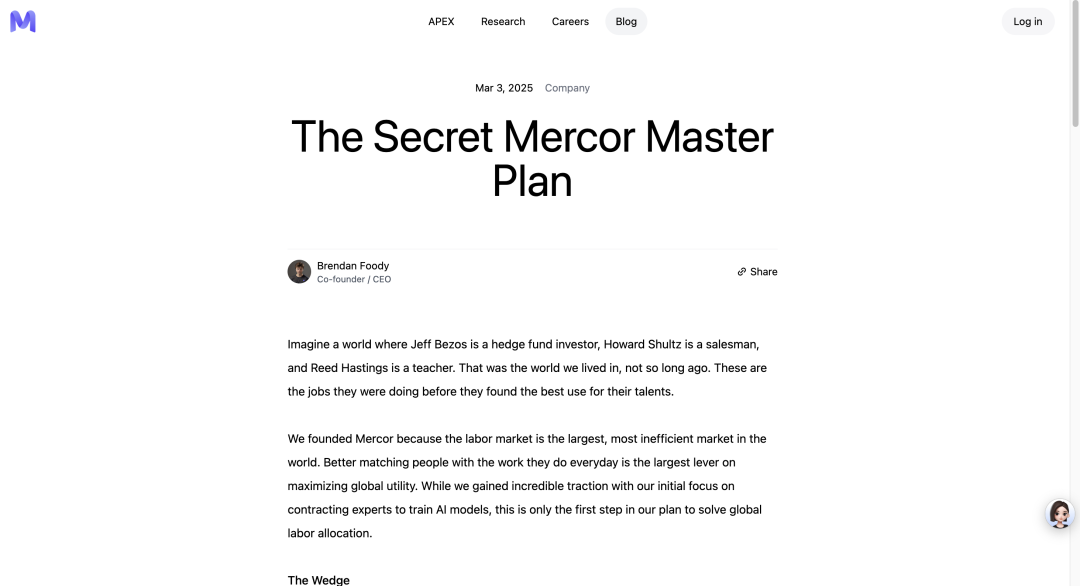
To date, over 300,000 professionals have used Mercor's platform to find short-term jobs. The platform enables job seekers to conduct remote interviews anytime, anywhere, and ultimately land work opportunities worldwide. Furthermore, it provides interview training and helps job seekers demonstrate their ability to solve complex problems in their professional fields—qualities highly valued by potential employers.
APEX Launch: Incorporating "Economic Value" into AI Capability Assessment
While building the human-machine collaboration market, Mercor also recognized a fundamental bottleneck: existing artificial intelligence evaluation systems often remain at the level of academic tasks or abstract benchmarks, making it difficult to directly reflect the actual productivity and economic value of models in complex knowledge-based work in the real world.To address this, Mercor launched the Artificial Intelligence Productivity Index (APEX) in October of this year—an assessment benchmark designed to bridge the gap between "academic assessment" and "real-world professional practice."
Paper address:
https://arxiv.org/abs/2509.25721
In short, APEX's starting point is not to ask "which model is stronger in mathematical competitions or semantic understanding", but rather: "When a model replaces or assists professionals in performing tasks with clear economic value, how well can it do it? How much value will it create? How will it change the workforce structure?" This is a more practical question that is closer to industry decision-makers—and has direct business and strategic significance for companies like Mercor that provide talent and serve AI training and productization.
APEX was designed as the first benchmark to assess the ability of AI models to perform economically valuable knowledge work.To this end, Mercor has partnered with dozens of industry and academic experts to create a set of tasks representing four professions (investment banking associate, large law firm associate, strategic consulting associate, and general practitioner), and plans to expand to more positions, industries, and countries in the future.
The team of experts who helped build and endorse APEX includes prominent figures such as former Treasury Secretary Larry Summers, former McKinsey managing partner Dominic Barton, legal scholar Cass Sunstein, and cardiologist Dr. Eric Topol. This not only enhances the feasibility of the task design but also increases the credibility of the benchmark in the industry.
APEX v1.0 evaluated 21 state-of-the-art models.This includes top-performing closed-source and open-source models. Each model takes a prompt and references as input and outputs its response as a long text. The text responses are scored by a panel of LLM reviewers using expert-defined scoring criteria (majority voting). The overall score for each response is defined as the average number of times the criteria are met.
In the APEX v1.0 test, GPT-5 achieved the highest score of 64.21 TP3T, while the best-performing open-source model, Qwen3, ranked seventh with a score of 59.81 TP3T.The highest score was in the legal field (70.5%), and the lowest score was in the investment banking field (59.7%).
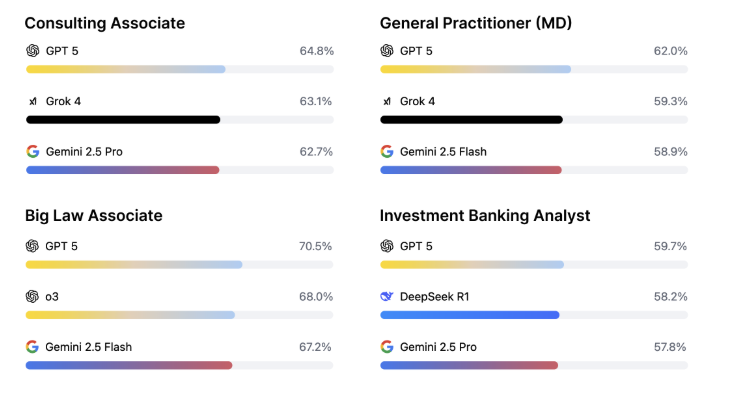
In all four industries examined, no model could complete the task independently without supervision—in practical applications, all models still require extensive human supervision and validation.
Nevertheless, the team remains cautiously optimistic about the results: APEX involves complex tasks requiring advanced reasoning, multi-hop knowledge integration, and expert-level judgment; if future models can significantly improve their performance on such tasks, the potential economic impact would be enormous. The evaluation team estimates that, ideally, models capable of autonomously completing complex knowledge-based tasks could unlock hundreds of billions of dollars in value for the US economy—provided that reliability and security are adequately guaranteed.
Embracing the Silicon Valley work culture, a 6-day work week
At Mercor, the company views a "fast-paced" and "high-intensity" environment as essential for achieving significant goals..
Within Mercor's self-defined value system, this work arrangement is packaged as a "culture of striving"—the founding team positions the company as a combat force in the "sprint phase," requiring the team to invest more time and a higher frequency in core aspects such as product, market, and technology than its peers, while also competing with tech giants that are constantly upgrading their artificial intelligence technologies, and facing challenges from AI giants such as OpenAI and Anthropic.
In an interview with Forbes, CEO Brendan Foody said that the company used to work seven days a week, but began to have Sundays off about a year after its founding. Foody believes that "if a company grows to around 1,000 employees, the corporate culture must change, but ideally, we will try to maintain a 6-day-a-week culture as much as possible."
Mercor transitioned from a 7-day work week to a 6-day work week, a move the founders saw as a practical choice to ensure rapid expansion. Under this arrangement, from Monday to Saturday, the team's daily routine includes daytime meetings and project deliveries, often extending into evenings and even weekends. Job postings even explicitly listed "willingness to work 6 days a week" as a requirement.In addition, the company will provide a $10,000 housing allowance to employees who live within half a mile of the San Francisco Financial District office.

This choice means that employees joining Mercor must have the mindset of "disregarding daily rest and standing with the company through thick and thin." The company believes that the current artificial intelligence field is an environment of "short window of opportunity and extremely fierce competition," and in this context, "whoever can get involved earlier and continue to invest" is likely to gain a scale advantage earlier.
While this work system may appear "high-pressure" and "dedication-oriented" from the outside, it is seen internally as a cultural declaration: choosing to join Mercor is not just about securing a "stable position," but about embarking on a "high-growth" and "unceasing" entrepreneurial journey. Employees and the company accelerate in sync, not just in terms of time, but also in terms of shared rhythm, mindset, and mission.
Capital Frenzy: From Seed Round to Billion-Dollar Valuation at Rocket Speed
Mercor's explosive growth naturally attracted a frenzy of investment from Silicon Valley capital.
After completing its Series A funding in 2024, the company quickly secured $100 million in Series B funding led by Felicis Ventures in February 2025, boosting its valuation to $2 billion.Just eight months later, the Series C funding round increased the valuation fivefold to $10 billion, bringing the total funding to over $350 million.
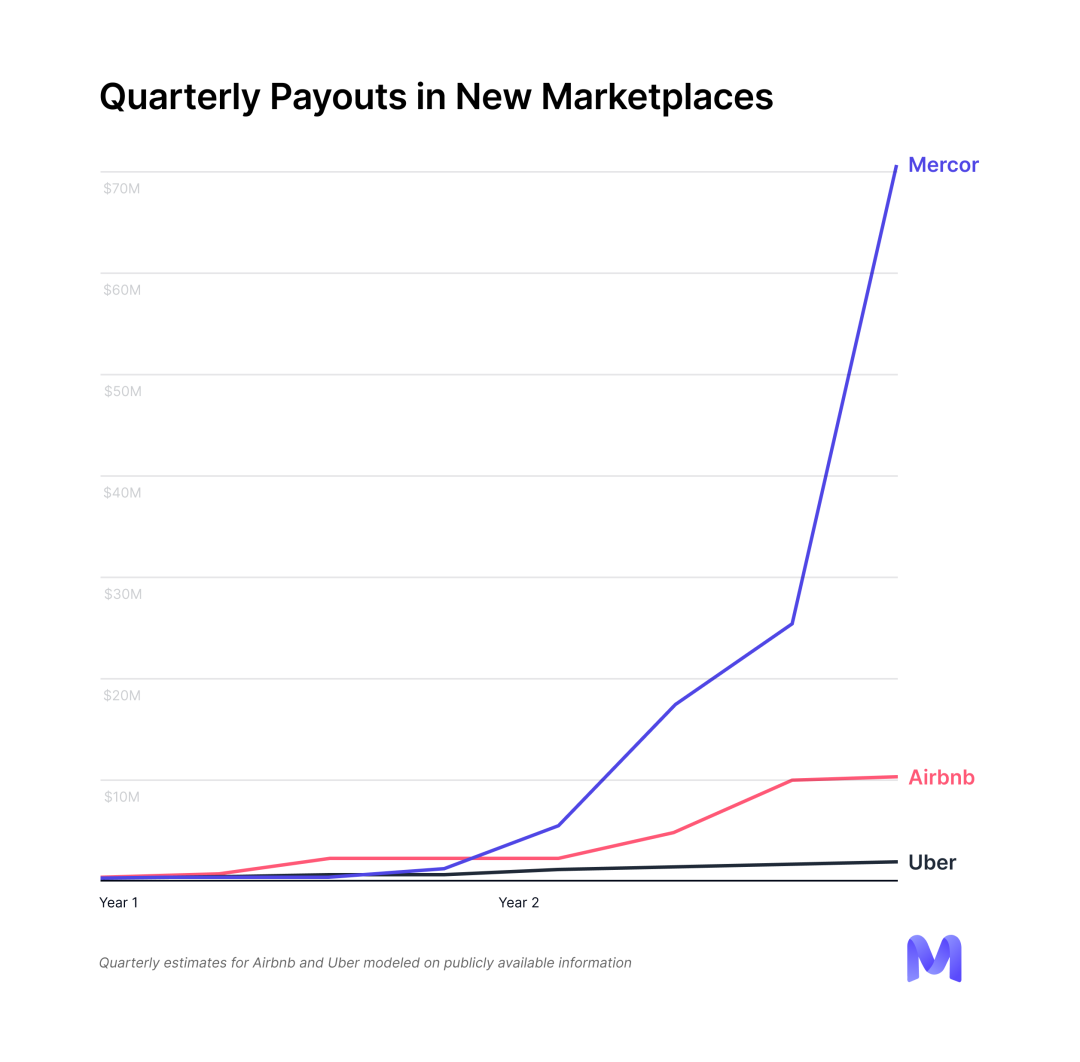
Behind this capital feast lies investors' strong optimism about the "human-machine collaboration" model. Aydin Senkut, founder of lead investor Felicis Ventures, stated bluntly: "Mercor is building the infrastructure for the future AI economy, making human intelligence an indispensable part of AI systems. Experts with specialized knowledge who can provide judgment and feedback will become the most valuable labor resource in the AI era." Besides Felicis, established venture capital firms like Benchmark and General Catalyst have continued to invest, and new investor Robinhood Ventures has also decisively entered the fray. Even Silicon Valley heavyweights like Peter Thiel, Twitter co-founder Jack Dorsey, and former US Treasury Secretary Larry Summers have lined up as angel investors, demonstrating the market's recognition of its business model.
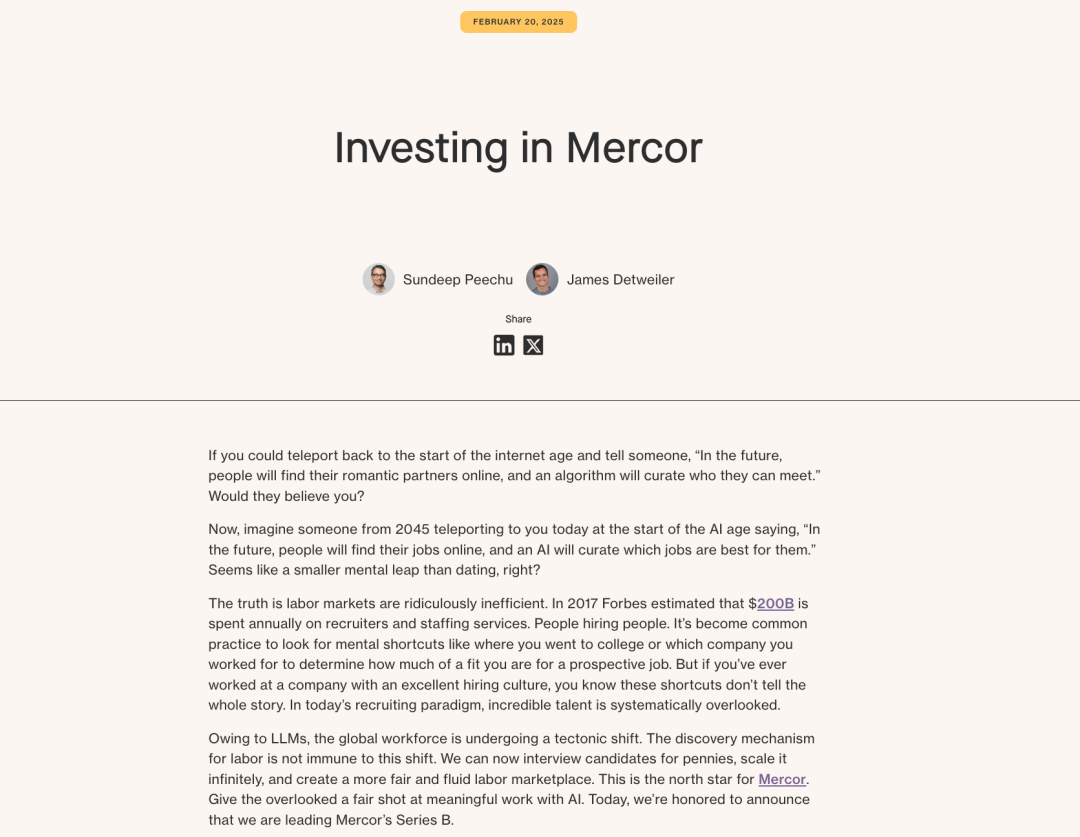
One detail from the financing process highlights Mercor's appeal.
In September 2025, media reported that Mercor was in talks for a Series C funding round with a target valuation of $10 billion, compared to a target valuation of only $8 billion just a few months earlier. The reason for the increased valuation expectation was that the company received multiple investment offers, and investors were willing to accept higher valuations to secure a share. These three AI-driven startups successfully reversed the situation into a "seller's market."
The injection of capital further accelerated Mercor's expansion. According to the company's disclosed plans, the Series C funding will primarily be used in three areas: expanding its global talent network, improving its expert matching system and training mechanisms, and increasing service delivery speed. They have established offices in San Francisco and India, expanding their staff to 150 people with an average age of only 22. They have recruited a large number of outstanding college dropouts of similar age, creating a highly motivated young team. As Foody stated, "The barrier to entry for entrepreneurship is much lower than before; more and more young people are no longer wasting time completing university in a conventional manner, but are directly engaging in innovative practices."
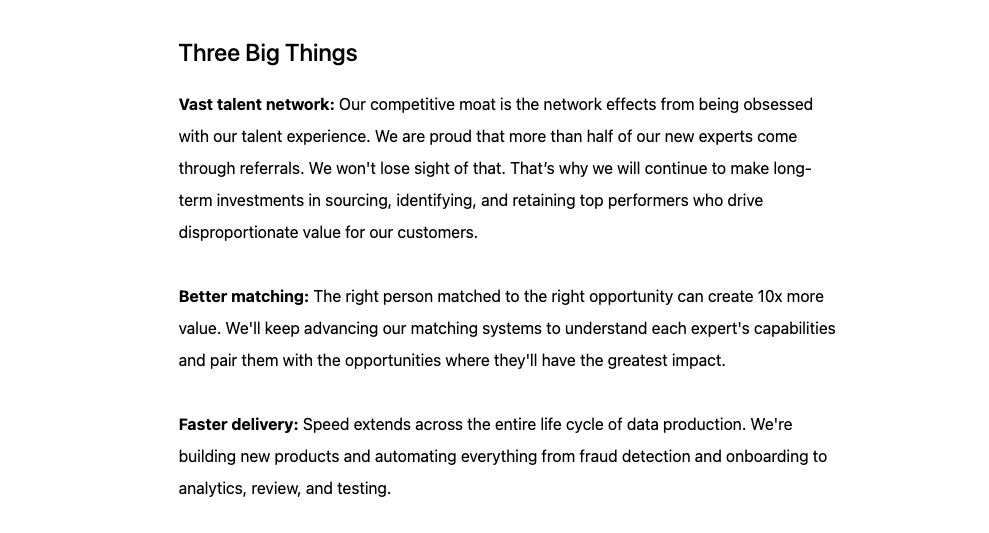
It's worth mentioning that Mercor's rise also unexpectedly benefited from the turmoil surrounding its competitors.
In June 2025, Meta acquired a stake in Scale AI (49%) for $14 billion. Scale's CEO, Alexandr Wang, left to join Meta. This caused many AI labs to worry about data security, leading them to stop collaborating with Scale AI and instead turn to Mercor, directly doubling Mercor's revenue. Although Mercor is currently smaller than Scale AI and Surge, its $10 billion valuation has made it a core player that cannot be ignored in this field.
Final Thoughts
With Mercor's rapid development, this young AI startup has not only achieved remarkable success in the capital market and in terms of business scale, but also faces new challenges and tests.
In September 2025, Mercor faced an unexpected legal dispute. Scale AI has filed a lawsuit in San Francisco federal court, accusing former employee Eugene Ling of taking company trade secrets to Mercor after leaving the company, including customer strategies, pricing models, and internal process documents, in an attempt to use this information to expand cooperation with Scale's customers. Mercor responded that it had not accessed the relevant documents and had proactively contacted Scale to seek communication and a solution. This case has attracted widespread attention in Silicon Valley.
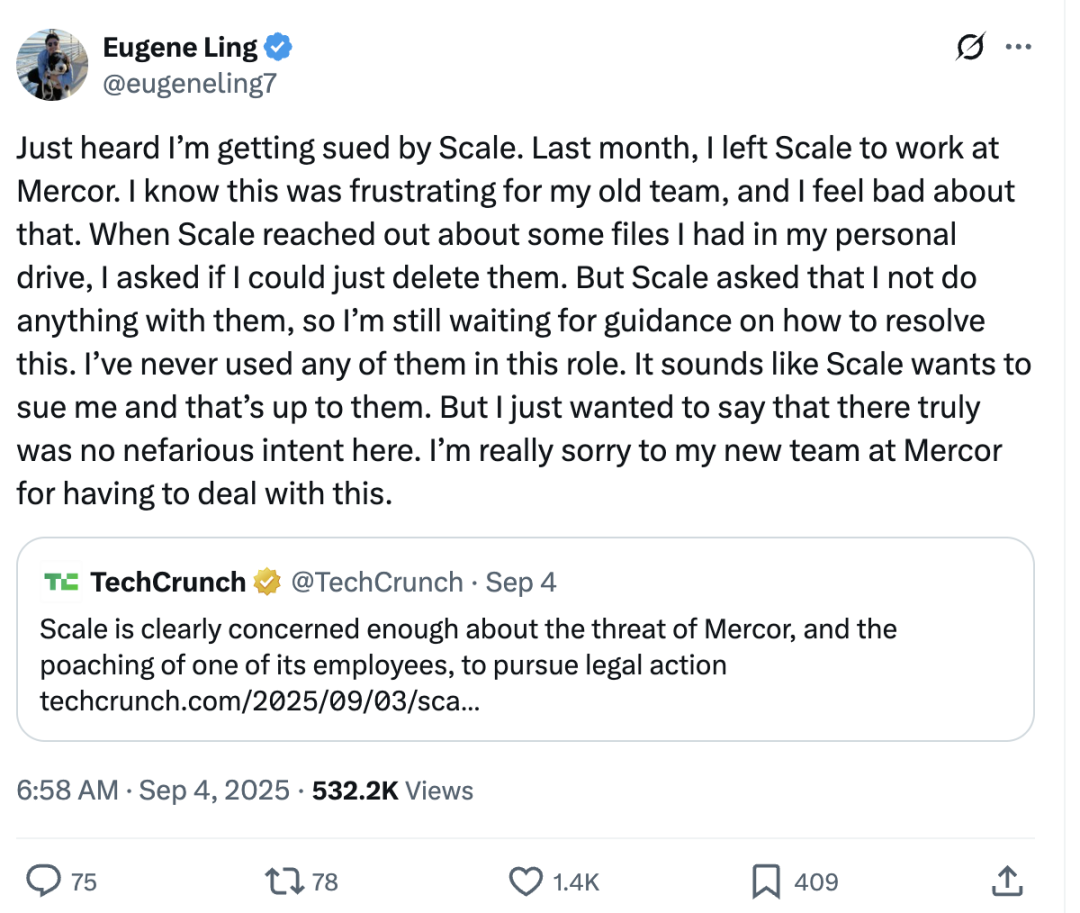
Following that in October of this year,Mercor has undergone another major internal team change – one of the founders and Chief Operating Officer, Surya Midha, announced her resignation from the position of Chief Operating Officer on the X platform.He has been appointed Chairman of the Board. This news has once again focused investors and industry observers' attention on Mercor's management stability and future development strategy. The founder's personal plans, corporate governance, and long-term vision remain the focus of industry attention.
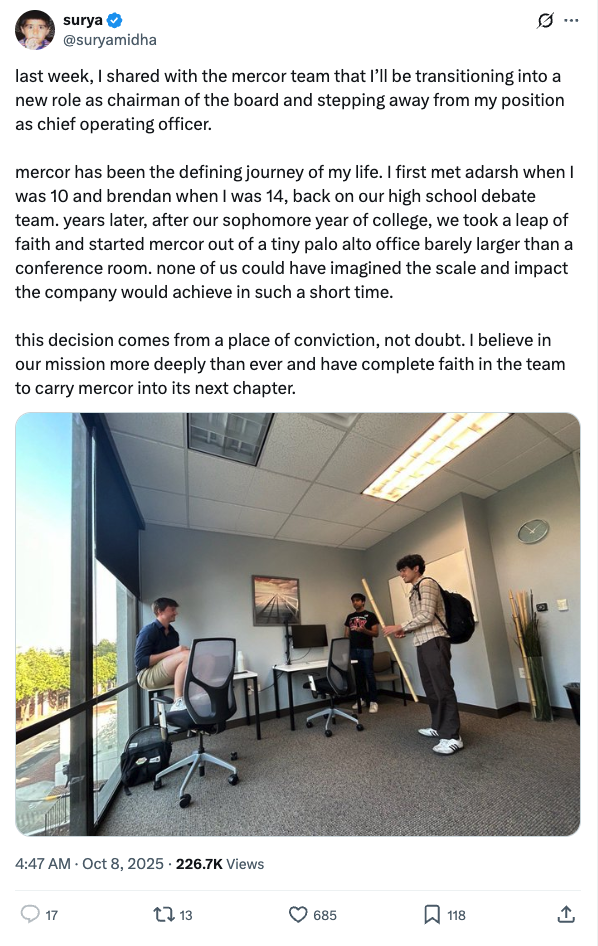
Mercor's growth has inevitably been accompanied by risks: legal disputes and team changes have forced the company to maintain caution and resilience while pursuing technological innovation and market expansion. Nevertheless, Mercor's transformation from a small Silicon Valley team founded by college dropouts to a globally renowned AI company valued at billions of dollars in less than three years demonstrates the remarkable insight and execution capabilities of its founding team in understanding industry trends and technological innovation.
As Foody said, "This is a turning point for AI, and we don't want to miss it, nor will we." And Mercor's legend has only just begun.
Reference Links:
1.https://www.globalindiantimes.com/p/johs-recruitment-22025
2.https://www.forbes.com/sites/richardnieva/2025/10/30/mercor-youngest-self-made-billionaires/
3.https://techcrunch.com/2025/10/27/mercor-quintuples-valuation-to-10b-with-350m-series-c/
4.https://www.ktvu.com/news/3-bay-area-high-friends-college-drop-outs-behind-2b-ai-recruiting-startup



